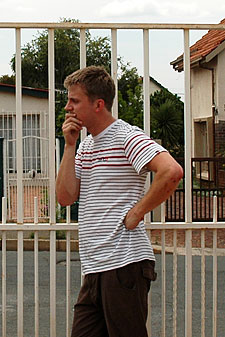As a World Day of Zimbabwe was announced, Sydney Anglican Andrew Robinson spoke to a Zimbabwean student about the crisis in his country.
Christians of every denomination in every nation have been called to a day of prayer on Sunday for Zimbabwe in view of the ongoing crisis.
 Andrew Robinson of Springwood-Winmalee Anglican Church, is spending his second year in ministry in Johannesburg, and spoke with Zimbabwean Thabo Khumalo* - who is studying theology in South Africa - about the crisis in his home country.
Andrew Robinson of Springwood-Winmalee Anglican Church, is spending his second year in ministry in Johannesburg, and spoke with Zimbabwean Thabo Khumalo* - who is studying theology in South Africa - about the crisis in his home country.
Listen in on Andrew and Thabo’s chat
AR: What is the churches' role?
TK: [When the crisis] started in 1998… the bravest pastors would fire their shots from the pulpit. The evangelical group of churches… initially acted with one voice, but the Government reacted by singling out personalities… and hitting at them. When that happened, the rest of the churches went under the carpet, but the Roman Catholic Church remained vocal [and] because it is funded from overseas has played a big role in supplying food.
AR: How has the crisis led to the rise of sects?
TK: While the mainline churches were being suppressed… a group of the indigenous churches, best described as sects, began to gain prominence.
The Government began to elevate these churches " one guy in Government… Border Gezi, was very active in mobilising people for the party" He belonged to a particular [syncretistic African] apostolic faith sect, and raised their status from nowhere, publicising their conferences, rallies…
Another worrisome development, [is they are] reviving traditional African religion… We're constitutionally a Christian country… but now they are suggesting using traditionalists to perform the role pastors or priests would do at functions and school assemblies.
From my assessment, all these developments [are] a desperate way of blocking the mainline churches from having their voices heard. The Government's perception is that the churches were anti-Government… so they intend to muffle their voice, and bring these other guys to take that space.
AR: How is ministry affected?
TK: It has dented the church's evangelism. Now there is legislation which says any gathering has to be cleared… The joke is that if there are four of you there, one will be CIO [secret police]. You'll get in trouble for preaching the word of God.
On the positive side - they're concentrating on bringing people to Christ.
With no one knowing where they'll get their next meal, it has caused the church to exercise faith in what they are doing. Human planning does not work in an economy like ours. You have to trust God" faith is getting people moving.
Prayer call comes amid genocide fears
The call to prayer has come from the Anglican Diocese of Harare’s chancellor, Bob Stumbles, for “a nation in dire distress and teetering on the brink of human disaster”.
“Let the cry for help touch your heart and mind,” Mr Stumbles has written.
“Let it move you to do what you can immediately to ensure this Day of Prayer takes place in your country and neighbourhood.”
Mr Stumbles hopes the call will be answered by Christian individuals, churches and organisations who are “anxious to rescue Zimbabwe from violence, the concealing and juggling of election results, deceit, oppression and corruption, and to bring about righteousness, joy, peace, compassion, honesty, justice, democracy and freedom from fear and want”.
Quoting Galatians 5:1 and Romans 12:21 respectively, Mr Stumbles has advised Zimbabweans to “Stand fast, and do not let yourselves be caught again in the yoke of slavery… [and] “do not be overcome by evil but overcome evil with good.”
The call comes after Zimbabwean church leaders have urged other African countries and the UN to intervene before post-election violence turns to genocide.
“If nothing is done to help the people of Zimbabwe from their predicament, we shall soon be witnessing genocide similar to that experienced in Kenya, Rwanda, Burundi and other hotspots in Africa and elsewhere,” they said.
“We appeal to the Southern African Development Community (SADC), the African Union and the United Nations to work towards arresting the deteriorating political and security situation in Zimbabwe.”
* Not his real name























